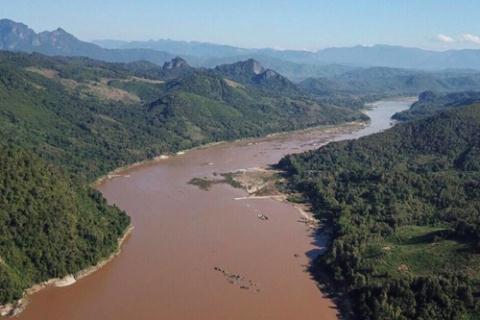After the Laos Mekong River Committee sent a plan on implementing the Luang Prabang hydropower project, the Ministry of Natural Resources and the Environment on November 4 consulted with relevant ministries and branches on how to mitigate the impact of the hydropower plant on Vietnam.

According to the Deputy Minister of Natural Resources and the Environment and deputy chair of the Vietnam Mekong River Committee, Le Cong Thanh, on the upper course of Mekong, China has completed construction and put into use 11 hydropower works. On the lower course, Cambodia, Laos and Thailand are planning to build 11 hydropower works on the mainstream.
Laos has nearly completed two works, Xayaburi and Don Sahong, while it is conducting consultation on other two others, Pak Beng and Pak Lay.
| The Luang Prabang hydropower plant in. Laos must undergo a full assessment of the possible impact on the ecosystem before construction, experts say. |
Tai Nguyen va Moi Truong newspaper quoted Deputy Minister Thanh as saying that unlike other hydropower power plans on the Mekong mainstream, the list of Luang Prabang investors includes a Vietnamese enterprise.
Though Vietnam will make an investment in Luang Prabang, all procedures of consultation must be followed in accordance with regulations and must meet technical standards set by the International Mekong River Commission.
“The decision to invest in Laos’ Luang Prabang hydropower project will help Vietnam take the initiative in participating from the very beginning in the process of designing, execution and operation of the plant. This will allow Vietnam to minimize the impact of not only this hydropower plant, but also other hydropower works on the Mekong mainstream,” Thanh said.
Based on the results of the consultation, Vietnam will also work closely with other member countries to ask investors to adjust the project design and complete the measures to mitigate the impact of the work.
The scientists attending the consultation workshop all affirmed that Vietnam’s Mekong Delta has been and will bear an impact from the development of hydropower dams on the Mekong mainstream, especially in the context of increasingly high demand for water natural resources, climate change, landslides and saline intrusion.
To Van Truong, an environmental expert, in his article in Thanh Nien, said if Laos does not cancel the project, Vietnam needs to ask Laos to deal with the negative consequences of hydropower works in the upper course to ensure the sustainable development of the river.
Chi Mai

Vietnam's Mekong Delta needs to be innovative to overcome climate change: experts
The Mekong Delta Region needs to be more innovative in production to grow sustainably in the context of climate change and environmental and integration challenges, experts have said.

Will Vietnam's Mekong Delta be under water by 2050?
Some Vietnamese scientists believe the finding that Vietnam’s Mekong Delta will be under water by 2050 is reliable, and that Vietnam needs to be more active in implementing measures to delay subsidence and fight floods.
 The Luang Prabang hydropower plant in. Laos must undergo a full assessment of the possible impact on the ecosystem before construction, experts say.
The Luang Prabang hydropower plant in. Laos must undergo a full assessment of the possible impact on the ecosystem before construction, experts say.